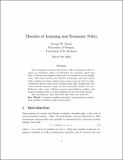Files in this item
Theories of learning and economic policy
Item metadata
| dc.contributor.author | Evans, George W. | |
| dc.date.accessioned | 2022-02-11T11:30:11Z | |
| dc.date.available | 2022-02-11T11:30:11Z | |
| dc.date.issued | 2021-07-09 | |
| dc.identifier | 275214606 | |
| dc.identifier | 5c979c6d-f6ae-4b82-a776-e8f292468659 | |
| dc.identifier | 85109820887 | |
| dc.identifier | 000810343500011 | |
| dc.identifier.citation | Evans , G W 2021 , ' Theories of learning and economic policy ' , Revue d'Economie Politique , vol. 131 , no. 3 , pp. 583-608 . https://doi.org/10.3917/redp.313.0265 | en |
| dc.identifier.issn | 0373-2630 | |
| dc.identifier.other | RIS: urn:72C990CA7E91EB800105AE9D8F86A527 | |
| dc.identifier.uri | https://hdl.handle.net/10023/24854 | |
| dc.description.abstract | The benchmark rational expectations (RE) assumption both assumes an unrealistic degree of rationality for economic agents and fails to address how agents would come to coordinate on an equilibrium. This essay reviews how theories of learning, and more specifically adaptive learning, address these issues and can lead to policy conclusions distinct from those obtained under RE. Applications discussed include monetary policy in New Keynesian models, the neo-Fisherian policy view, inflation targets, hyperinflation models, and macroeconomic policy to avoid stagnation at the zero lower bound. | |
| dc.format.extent | 26 | |
| dc.format.extent | 302044 | |
| dc.language.iso | eng | |
| dc.relation.ispartof | Revue d'Economie Politique | en |
| dc.subject | Bounded rationality | en |
| dc.subject | Expectational coordination | en |
| dc.subject | Fiscal policy | en |
| dc.subject | Learning | en |
| dc.subject | Monetary policy | en |
| dc.subject | Stability | en |
| dc.subject | HB Economic Theory | en |
| dc.subject | I | en |
| dc.subject | AC | en |
| dc.subject.lcc | HB | en |
| dc.title | Theories of learning and economic policy | en |
| dc.type | Journal article | en |
| dc.contributor.institution | University of St Andrews. School of Economics and Finance | en |
| dc.identifier.doi | 10.3917/redp.313.0265 | |
| dc.description.status | Peer reviewed | en |
This item appears in the following Collection(s)
Items in the St Andrews Research Repository are protected by copyright, with all rights reserved, unless otherwise indicated.

